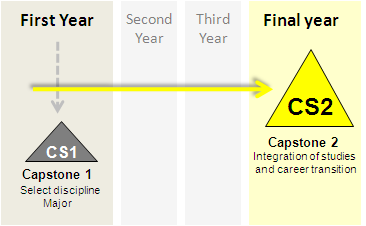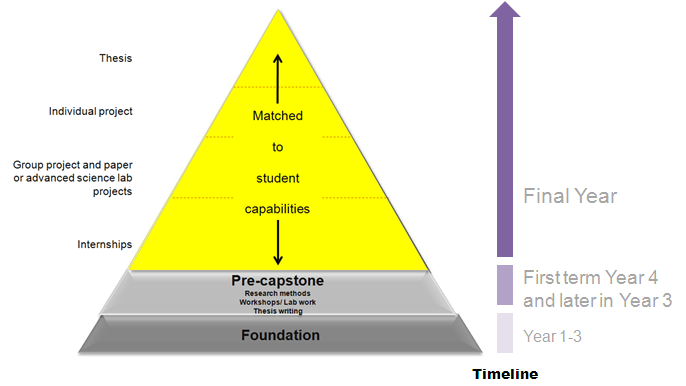Designing a Capstone Experience
What is a Capstone?
A capstone activity is a culminating experience in the undergraduate students’ university life.
Essentially, the idea of a capstone experience means this learning activity need not be limited to a single course. Rather, it should be viewed as a consolidation of the study experience using several means that act in synergy to achieve the broad emphases (students’ development or assessment) and subsequent design characteristics identified below.
If you want a one page summary, please click here.
Capstone Experience @ CUHK
1.1 Capstone design
1.2 Capstone in the normative (four-year) curriculum
1.3 Suggested outcomes, activities and assessment
1.4 An illustration of a capstone experience
1. Capstone design: A summary
| Step 1: Decide your purpose – choose one emphasis | |
| Developmental: a culminating experience to facilitate transition generally into the workplace | Assessment of programme level learning outcomes & to improve instructional practices |
| Step 2: Choose the type of course or combination of types that best fits your purpose | |||
Interdisciplinary courses |
Discipline and department-based courses |
Transition courses(to work/ graduate school) |
Career-planning courses |
| Synthesize GE, Major and Co-curricular learning | Synthesize discipline knowledge and generic capabilities | Life transition planning, self-assessment | Job search, financial planning, first year on the job |
| Step 3: Consider these four design characteristics in your proposed capstone activity | |||
Integration** (I) |
Reflection (R) |
Closure (C) |
Transition (T) |
| Integrate knowledge and skills | Reflect on development – academically, socially and personally. | Close undergraduate student life | Transition from undergraduate studies to being self-autonomous learners. |
| Step 4: Choose the activities and assessment | ||||||
What are we developing/ or assessing
(Indicative) |
How (Authentic learning activities)
(Indicative)
|
Authentic assessment methods
(Indicative)
|
Design characteristics |
|||
(I) |
(R) |
(C) |
(T) |
|||
| University community | Project work, service | Group project, self reflection | √ |
√ |
√ |
√ |
| Discipline knowledge | Project work, group presentation, simulation, thesis | Presentation, peer assessment, group projects, reflections | √ |
√ |
√ |
√ |
| Academic skills, self-directed learning e.g. research, collaboration | Group presentation/case analysis/ Simulation/ Lab experiment report | Presentation, participation, peer assessment | √ |
√ |
√ |
|
| Self awareness | Reflection journal / Blog | Reflection; Pass/Fail | √ |
√ |
||
| Leadership skills/ Teamwork/ Interpersonal skills | Group project, team-based activities, Career planning | Group project, peer assessment, reflection, presentation | √ |
√ |
√ |
√ |
| Problem-solving skills | Case analysis/ Group/ Research project/ Simulation | Group project, peer assessment,reflection | √ |
√ |
√ |
√ |
| Citizenship | Service learning | Not assessed | √ |
√ |
||
Capstone activity illustrated (organised around two broad emphases):
1. Student development
a. culminating experience to facilitate transition generally into the workplace

2. Assessment
of programme level learning outcomes and to improve instructional practices

1.2 Capstone experience (illustrated) in the normative curriculum
|
CS1, for illustration purposes, could appear in the first year in order to support student transition into university life, confirm foundational skills and support their choice of discipline major. CS2 is the final year capstone experience; the key result is to integrate studies and assist students’ transition to the workplace (or into postgraduate study). |
 |
1.3 Suggested outcomes, activities and assessment (Matrix)
|
What are we assessing
Indicative) |
How (Authentic learning activities)
Indicative) |
Authentic assessment methods
(Indicative) |
| University community | Project work, service | Group project, self reflection |
| Academic skills, e.g. research, collaboration |
Group presentation/case analysis/ Simulation/ Lab experiment report | Presentation, participation, peer assessment |
| Self awareness | Reflection journal / Blog | Reflection; Pass/fail |
| Learning skills (deep/ surface) | Managed by faculty (supervisors) | Self assessed, reflection |
| Leadership skills | Group project, team-based activities, Career planning | Group project, peer assessment, reflection |
| Problem-solving skills | Case analysis/ Group/ research project/ simulation | Group project, peer assessment |
| Self-directed learning | Thesis, research | A designed rubric |
| Citizenship | Service learning | Not assessed |
1.4 A conceptual illustration of a capstone experience
 |
Adapted from: UCLA Report for the WASC Capacity and Preparatory Review (December 2007) |
Useful Resources
Books
| 1. | Introduction
|
Links
| 1. | Examples of Capstones • Partnership with community: Portland State University, United State http://capstone.unst.pdx.edu/ |
| 2. | Developing capstone experience • Designing a capstone unit, Macquarie University, Australia https://teche.mq.edu.auhttps://clear.cuhk.edu.hk/web/wp-content/uploads/2018/07/Designing_capstone_units.pdf • University of Melbourne, Australia https://melbourne-cshe.unimelb.edu.au/__data/assets/pdf_file/0020/1761203/Capstone_Guide_09.pdf • University of Hawaii, Manoa, United States https://manoa.hawaii.edu/assessment/resources/how-to/capstone-experiences/ |
| 3. | Capstone assessment as a summative assessment using rubrics • Capstone Evaluation Rubrics: Rhodes Island Skills Commission https://t-stemcapstone.weebly.com/uploads/2/1/0/5/21059592/capstoneprojectmanual.ri.skillscommission.pdf • Grading and Performance Rubrics, examples from Eberly Center for Teaching Excellence, Carnegie Mellon University http://www.cmu.edu/teaching/designteach/teach/rubrics.html • Rubric for assessing outcomes in business information systems via capstone projects https://www.researchgate.net/publication/254706204_RUBRIC_FOR_ASSESSING_OUTCOMES_IN_BUSINESS_INFORMATION_SYSTEMS_VIA_CAPSTONE_PROJECTS • Using Rubrics for Evaluating Student Learning https://www.slideserve.com/luke/using-rubrics-for-evaluating-student-learning-powerpoint-ppt-presentation |
| 4. | Evaluation template of Capstone experience • Obtaining students’ feedback: First National Survey of Senior Seminars/Capstone Courses National Resource Center for The First-Year Experience & Students In Transition University of South Carolina, Columbia, South Carolina 2008 http://www.sc.edu/fye/research/surveyfindings/pdf/SeniorSeminarSurvey.pdf |
| 5. | Programme self-evaluation of capstone course • Rubric for Assessing the Use of Capstone Experiences for Assessing Program Learning Outcomes, Western Association of Schools and Colleges https://www.csusm.edu/assessment/programreview/wasc_rubric_quality_plo.pdf • UCLA Survey for Capstone Requirement in 2008 https://capstones.ucla.edu/the-initiative/criteria-options/ |
| 6. | Survey findings on capstone experience • Henscheid, J. M. (2000). Professing the disciplines: an analysis of senior seminars and capstone courses. (Monograph Series No. 30). Columbia, SC: University of South Carolina, National Resource Center for The First-Year Experience and Students in Transition. https://files.eric.ed.gov/fulltext/ED446711.pdf • National Survey of Student Engagement (2007) – page 19 https://scholarworks.iu.edu/iuswrrest/api/core/bitstreams/d2f5d7e6-e95f-4d3d-a586-fe8ee6780e1c/content • National Survey of Student Engagement (2009) – page 15-17 https://files.eric.ed.gov/fulltext/ED507080.pdf • UCLA report for WASC Capacity and Preparatory Review 2007, page 23-26, Shaping Undergraduate Education via the Capstone Experience https://wscuc.ucla.eduhttps://clear.cuhk.edu.hk/web/wp-content/uploads/2017/09/CPR_Final.pdf • UCLA College Senior Survey 2023, academic experience https://www.college.ucla.edu/seniorsurvey/survey-results/academic-experience/ |
| 7. | Presentation related to Capstone • Kinzie J., McCormick A. & Laird T. N. (2010). Capping Off the College Experience: Participation and Effects of Capstone Courses. NSSE and the Indiana University Center for Postsecondary Research AAC&U Annual Meeting 2010, Washington DC Presentation in PPT format: https://scholarworks.iu.edu/iuswrrest/api/core/bitstreams/9e1bbca6-ae33-4ac1-a514-ce3cd366878a/content • McNeill M. (2009). Capstone design and curriculum renewal Learning and Teaching Centre, Macquarie University, Australia https://slideplayer.com/slide/10717961/ |
Capstone Presentation in CUHK
